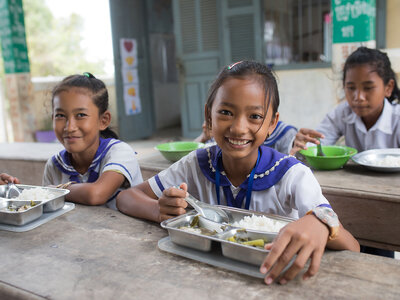Cambodia
- 22 percent
- of children under 5 are stunted (impaired development due to malnutrition)
- 16 percent
- of households cannot afford a nutritious diet
- 16.8 million
- population
Cambodia has witnessed significant economic transformation in recent years. However, progress remains fragile, challenged by geographical and gender disparities, as well as vulnerability to shocks – including climate-related disasters that can undo years of developmental gains. A substantial portion of the population still faces food insecurity, poverty and shocks. Malnutrition rates are high, with 10 percent of children below 5 suffer from wasting (low weight for height) and 22 percent experiencing stunting (impaired development), while micronutrient deficiency and overweight/obesity are on the rise.
Despite these challenges, the Government of Cambodia has set an ambitious goal of middle-income status by 2030 and high-income status by 2050, by sustaining growth and accelerating structural transformation.
To support the above goal, Cambodia’s sustainable development relies on eradicating malnutrition, enabling all people to reach their full potential and being resilient in the face of shocks.
The World Food Programme (WFP) has forged strong partnerships with the Government and communities. We focus on strengthening human capital (people’s health, skills, experience and knowledge) through nutrition and social protection, supporting climate change resilience and emergency response. WFP has transitioned from direct implementation to providing technical assistance and support.
What the World Food Programme is doing in Cambodia
-
Crisis response
-
During large-scale disasters, WFP stands ready to complement the national response with food, cash and nutrition support. WFP places strong emphasis on the needs of people with disabilities and uses education materials and other advocacy toto promote healthy diets.
-
Nutrition
-
WFP supports the development of strategies, programmes and guidelines to prevent malnutrition at the national level, while working with provincial groups and authorities to advocate for increased investment in nutrition. WFP promotes rice fortification by supporting collaboration between public and private actors, generating evidence and advocating for regulatory frameworks and standards. WFP also supports the integration of fortified rice into the national home-grown school feeding programme and arranges communication and outreach campaigns to increase market demand.
-
Social protection
-
WFP supports the Government in strengthening national social protection systems that provide crucial support to vulnerable families, including at times of shocks and crises. WFP is transitioning the home-grown school feeding programme to full national ownership, ensuring every child receives a healthy meal to learn and grow. To complete the transition process, WFP provides technical assistance to the national programme in planning, financing and monitoring. WFP also supports the national shock-responsive social protection framework, facilitating coordination among institutions involved in disaster risk management and social protection, and exploring the design and evaluation of initiatives.
-
Food systems
-
WFP provides technical assistance and generates evidence for institutions and value chain actors, particularly women, to increase the resilience of food systems in the face of the climate emergency. At the national and subnational levels, WFP supports multisector coordination and policy development, contributing analytics for decision making. At the local level, WFP works with district authorities and producers, suppliers and farmers, among others, to increase food production, reduce losses, improve food safety and strengthen community-market connections. WFP promotes climate change adaptation through measures including use of resilient crops, improved irrigation and use of natural pesticides. The home-grown school feeding programme boosts local food markets, while promoting healthy diets and empowering women.
-
Disaster risk management
-
WFP provides technical support, coordination and evidence-generation services to national and subnational authorities and communities, so they can understand climate risks. Together, WFP and the Government establish protocols for early assistance, ensuring effective support before hazards escalate. WFP also coordinates the Humanitarian Response Forum and strengthens emergency preparedness and response coordination among partners, including contingency planning, advocacy, monitoring and supply chain management.
-
Evidence and analytics
-
Evidence and analytics are integral to WFP and play a crucial role in our activities and partnerships with the government. WFP produces analytical products that provide insights into real-time market prices, monitor climate hazards, track the affordability and accessibility of a nutritious diet, assess the adequacy of social protection benefits, and guide targeting. WFP uses this evidence to inform decision making, policy advocacy and the overall effectiveness of our initiatives.
Cambodia news releases
Go to pagePartners and donors
Find out more about the state of food security in Cambodia
Visit the food security analysis pageContacts
Office
House 108, Street 63, Sangkat Boeung Raing, Khan Daun Penh
Phnom Penh
Cambodia







